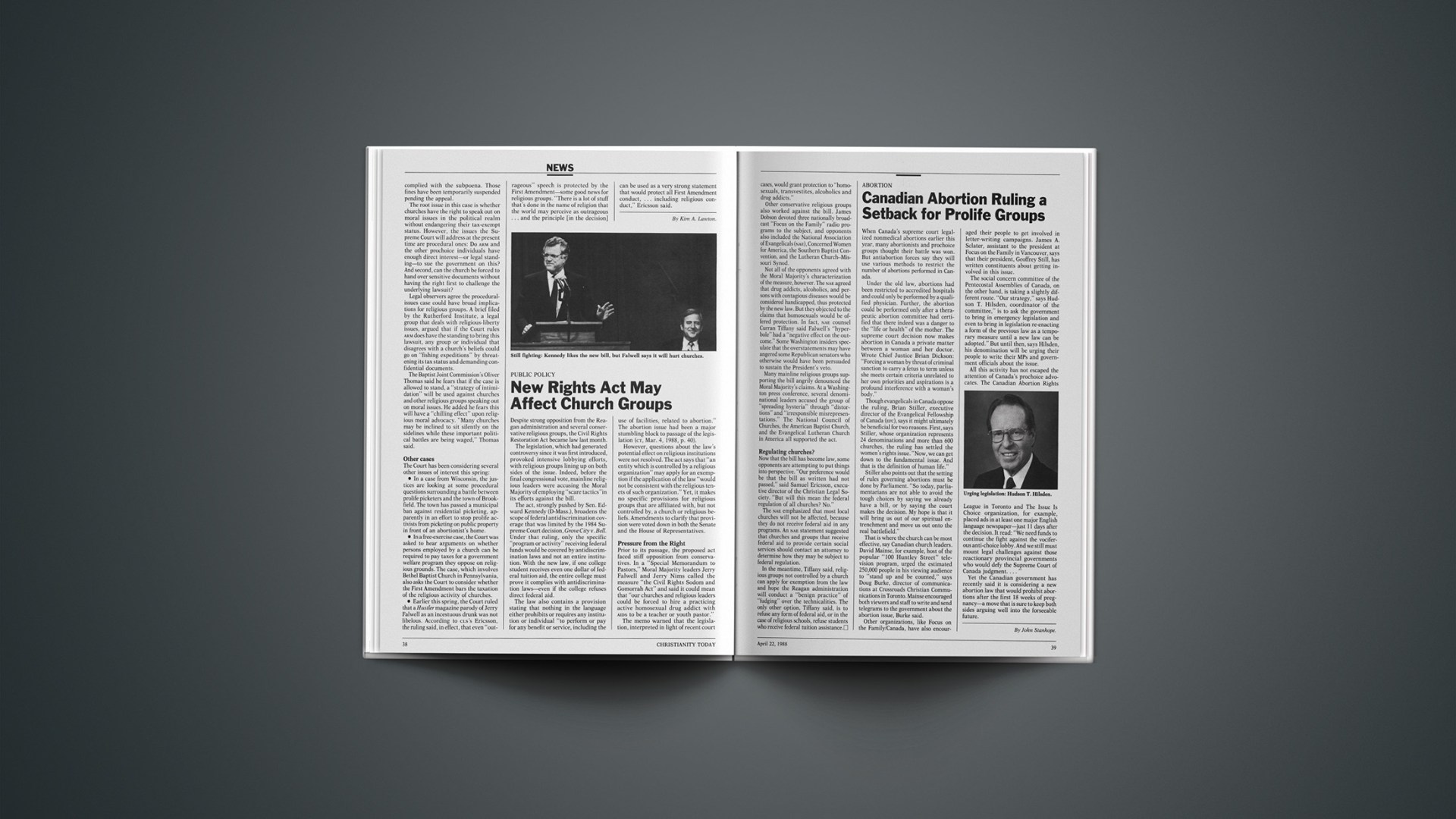PUBLIC POLICY
Despite strong opposition from the Reagan administration and several conservative religious groups, the Civil Rights Restoration Act became law last month.
The legislation, which had generated controversy since it was first introduced, provoked intensive lobbying efforts, with religious groups lining up on both sides of the issue. Indeed, before the final congressional vote, mainline religious leaders were accusing the Moral Majority of employing “scare tactics” in its efforts against the bill.
The act, strongly pushed by Sen. Edward Kennedy (D-Mass.), broadens the scope of federal antidiscrimination coverage that was limited by the 1984 Supreme Court decision, Grove City v. Bell. Under that ruling, specific “program or activity” receiving federal funds would be covered by antidiscrimination laws and not an entire institution. With the new law, if one college student receives even one dollar of federal tuition aid, the entire college must prove it complies with antidiscrimination laws—even if the college refuses direct federal aid.
The law also contains a provision stating that nothing in the language either prohibits or requires any institution or individual “to perform or pay for any benefit or service, including the use of facilities, related to abortion.” The abortion issue had been a major stumbling block to passage of the legislation (CT, Mar. 4, 1988, p. 40).
However, questions about the law’s potential effect on religious institutions were not resolved. The act says that “an entity which is controlled by a religious organization” may apply for an exemption if the application of the law “would not be consistent with the religious tenets of such organization.” Yet, it makes no specific provisions for religious groups that are affiliated with, but not controlled by, a church or religious beliefs. Amendments to clarify that provision were voted down in both the Senate and the House of Representatives.
Pressure From The Right
Prior to its passage, the proposed act faced stiff opposition from conservatives. In a “Special Memorandum to Pastors,” Moral Majority leaders Jerry Falwell and Jerry Nims called the measure “the Civil Rights Sodom and Gomorrah Act” and said it could mean that “our churches and religious leaders could be forced to hire a practicing active homosexual drug addict with AIDS to be a teacher or youth pastor.”
The memo warned that the legislation, interpreted in light of recent court cases, would grant protection to “homosexuals, transvestites, alcoholics and drug addicts.”
Other conservative religious groups also worked against the bill. James Dobson devoted three nationally broadcast “Focus on the Family” radio programs to the subject, and opponents also included the National Association of Evangelicals (NAE), Concerned Women for America, the Southern Baptist Convention, and the Lutheran Church-Missouri Synod.
Not all of the opponents agreed with the Moral Majority’s characterization of the measure, however. The NAE agreed that drug addicts, alcoholics, and persons with contagious diseases would be considered handicapped, thus protected by the new law. But they objected to the claims that homosexuals would be offered protection. In fact, NAE counsel Curran Tiffany said Falwell’s “hyperbole” had a “negative effect on the outcome.” Some Washington insiders speculate that the overstatements may have angered some Republican senators who otherwise would have been persuaded to sustain the President’s veto.
Many mainline religious groups supporting the bill angrily denounced the Moral Majority’s claims. At a Washington press conference, several denominational leaders accused the group of “spreading hysteria” through “distortions” and “irresponsible misrepresentations.” The National Council of Churches, the American Baptist Church, and the Evangelical Lutheran Church in America all supported the act.
Regulating Churches?
Now that the bill has become law, some opponents are attempting to put things into perspective. “Our preference would be that the bill as written had not passed,” said Samuel Ericsson, executive director of the Christian Legal Society. “But will this mean the federal regulation of all churches? No.”
The NAE emphasized that most local churches will not be affected, because they do not receive federal aid in any programs. An NAE statement suggested that churches and groups that receive federal aid to provide certain social services should contact an attorney to determine how they may be subject to federal regulation.
In the meantime, Tiffany said, religious groups not controlled by a church can apply for exemption from the law and hope the Reagan administration will conduct a “benign practice” of “fudging” over the technicalities. The only other option, Tiffany said, is to refuse any form of federal aid, or in the case of religious schools, refuse students who receive federal tuition assistance.










